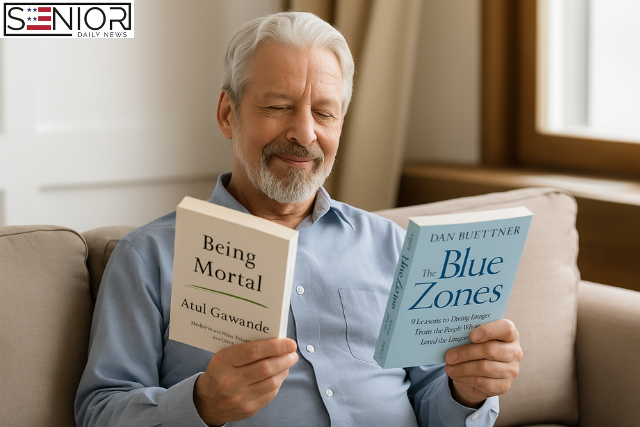Finding Comfort and Reflection: Why “Being Mortal” by Atul Gawande Is a Must-Read for Seniors

Aging comes with profound questions—about health, independence, dignity, and what it means to live fully even as our time becomes more finite. For seniors seeking a deeply thoughtful, human-centered exploration of aging and end-of-life care, Being Mortal: Medicine and What Matters in the End by Atul Gawande stands out as a powerful and compassionate read.
Why This Book Matters
Atul Gawande is a practicing surgeon and a best-selling author who blends personal stories, medical insights, and cultural analysis in Being Mortal. The book does not shy away from the hard truths of aging and mortality, but rather invites readers to examine them with honesty and hope. For seniors, this means recognizing that the goal is not just to prolong life, but to ensure it is meaningful to the very end.
Key Themes That Resonate With Older Adults
1. Autonomy and Purpose
One of the central themes is the importance of autonomy—being able to make choices about how we live and die. Gawande explores how medical institutions often prioritize extending life over improving its quality. For seniors, this is an empowering reminder that your voice, values, and preferences should guide your care decisions.
2. The Role of Family and Caregivers
Gawande highlights the emotional and practical challenges faced by families in supporting aging loved ones. Seniors will find themselves both reflected in these stories and better equipped to communicate with their own support systems.
3. Finding the Right Kind of Help
The book discusses alternatives to traditional nursing homes, including assisted living and hospice, and how they can offer dignity, comfort, and community. These sections offer practical insights into planning for the future, which can help seniors feel more prepared and less anxious.
A Book That Sparks Conversation
Being Mortal is not just a book to read alone—it’s one that encourages open dialogue. Seniors might find it especially meaningful to read with a spouse, adult child, or close friend. It opens the door to meaningful conversations about legacy, wishes, and how to live intentionally.
Human-Centered, Not Fear-Filled
What sets Being Mortal apart is its tone. Gawande’s writing is empathetic and deeply human. It does not sensationalize or depress; it enlightens. It makes aging feel less like a loss and more like a natural, noble stage of life with its own opportunities for connection and reflection.
Another Must-Read: “The Blue Zones” by Dan Buettner
While Being Mortal offers deep insights into aging and healthcare, The Blue Zones: Lessons for Living Longer from the People Who’ve Lived the Longest by Dan Buettner takes a different but equally valuable approach. This book is perfect for seniors who are interested in living healthier, longer, and more vibrant lives.
Buettner, a National Geographic explorer, identifies five regions in the world—known as Blue Zones—where people live measurably longer and better. These areas include Okinawa (Japan), Sardinia (Italy), Nicoya Peninsula (Costa Rica), Ikaria (Greece), and Loma Linda (California).
Lessons from the Longest-Lived People
1. Diet and Nutrition
People in Blue Zones eat a mostly plant-based diet, rich in vegetables, beans, and whole grains. They eat in moderation and often follow the 80% rule—stopping when they’re 80% full.
2. Physical Activity
Seniors in these areas don’t necessarily go to the gym but integrate movement into their daily lives. Gardening, walking, and performing household chores keep them active.
3. Social Connection
Community and family ties are strong in Blue Zones. Seniors often live with or near loved ones and remain socially engaged, which significantly boosts emotional well-being.
4. Purpose and Spirituality
Having a sense of purpose, or “ikigai” as it’s called in Okinawa, gives life meaning. Many centenarians also engage in spiritual or religious practices that provide comfort and direction.
5. Stress Reduction
Daily routines that reduce stress—like napping, meditating, or enjoying wine with friends—are common habits that enhance longevity.
A Complementary Read for Holistic Aging
While Being Mortal addresses aging with dignity, The Blue Zones complements it by promoting vibrant living. Together, these books form a holistic view of aging—offering both philosophical insight and practical strategies.
Inspiring the Reader to Take Action
After reading these books, seniors often feel motivated to make changes in their lives, whether it’s talking to family about future care, revising their diet, or joining a new community group. These books do more than inform—they inspire.
FAQs About Books for Seniors
Q: Are these books easy to read and understand?
A: Yes. Both Gawande and Buettner write in a conversational, engaging tone that is easy to follow regardless of your background.
Q: Do these books only focus on aging problems?
A: No. While they address challenges, they also celebrate the beauty, purpose, and possibility of later life.
Q: Can I find these books in large print or audiobook formats?
A: Yes. Both titles are available in large print, eBook, and audiobook formats for accessibility.
Q: Are these good gifts for aging parents or grandparents?
A: Absolutely. These books can provide comfort, guidance, and encouragement, making them thoughtful gifts.
Conclusion
Whether you are seeking comfort, clarity, or inspiration, Being Mortal and The Blue Zones offer unique yet complementary perspectives on the aging experience. One helps us prepare for the realities of later life with wisdom and grace, while the other empowers us to live those years with energy and purpose.
Together, they are essential reads for seniors, caregivers, and anyone who wants to age not only well, but meaningfully.
Image Designed Using ChatGPT AI






